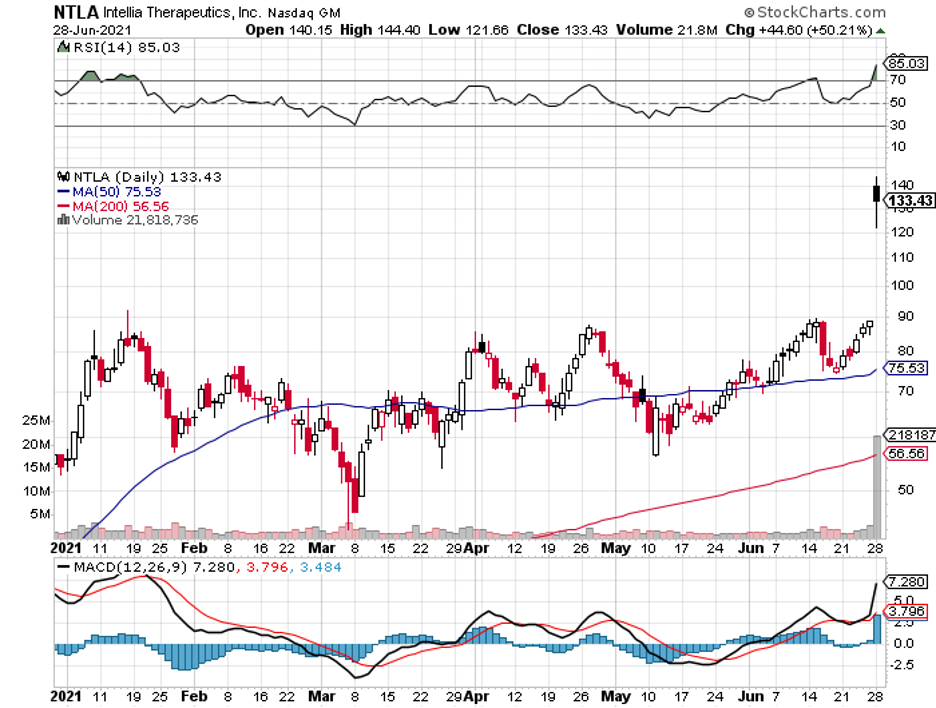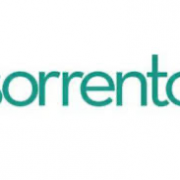Breaking New Ground With This Biotech Stock
The biotechnology world started the week right with a milestone announcement from its gene therapy sector.
Intellia Therapeutics (NTLA), along with its partner Regeneron (REGN), developed a potential cure for a genetic liver disease that previously had no cure.
Using the Nobel Prize-winning Crispr technology, Intellia was able to come up with the first-ever treatment for a disease that had been known to be extremely progressive and even fatal.
This achievement has been described to “open up a whole new area of therapies for patients that wasn't there.”
This is because instead of simply treating the symptoms of particular diseases, Intellia was able to demonstrate that it is possible to use gene editing to come up with a cure.
As expected, shares of Intellia shot up the moment the news broke, rising by 40% by the start of the week.
While this is definitely an incredible update for its investors, what’s even more impressive is the fact that this achievement marks the beginning of a revolution in the way we treat diseases.
Intellia’s treatment, called NTLA-2001, is delivered intravenously into the patient’s body. It’s designed to specifically target a progressive form of liver disease called ATTR amyloidosis. This disorder, while rare, is often fatal.
Right now, there are two companies working on this fast-growing segment. Pfizer (PFE) has Vyndagel and Vyndamex, while Alynlam Pharmaceutical (ALNY) has Onpattro. All these treatments are administered through infusions.
At this point, Alnylam holds the gold standard for ATTR treatment with Onpattro, as it delivers 80% capacity for blocking harmful proteins and reducing blood levels. Patients also need to go in every three weeks for dosing.
In comparison, Intellia’s NTLA-2001 is a one-time treatment. That in itself is a massive advantage for the company.
To add to that lead, Intellia’s candidate also showed an ability to drop protein levels by as high as 96% within just a matter of weeks, with no adverse side effects observed in patients.
This is possibly because the gene therapy was delivered directly to the patient’s liver, which is the source of the issue.
While the results are already promising, Intellia believes that it can achieve better outcomes in the future. According to its researchers, the company is looking into using a bone marrow delivery system to boost the efficacy rate of NTLA-2001.
So far, Intellia has received additional funding via a grant from the Bill & Melinda Gates Foundation to pursue the bone marrow delivery system idea.
If that works out, then the same system can be used to develop treatments for reverse sickle cell anemia and even cover other cardiovascular indications.
Although there’s still no word about the pricing for NTLA-2001, we can use Onpattro as reference for now. Alnylam’s treatment is priced at roughly $450,000 annually.
ATTR holds a fairly huge market. Going back to 2020, Onpattro generated over $300 million in revenue and is estimated to rake in more than $400 for 2021.
Considering that Intellia offers a one-and-done option, we can reasonably assume that the demand would be much higher for NTLA-2001.
Overall, ATTR’s total addressable market is estimated to be at $15 billion. However, ATTR is only the tip of the iceberg.
Studying the liver alone would reveal several genetic diseases that Intellia could address with its technology. Other than those, Crispr could still be applied to dozens of disorders linked to solid tumors.
In fact, the market for solid tumors is actually where the fortunes lie in the gene-editing field, with the sector projected to grow to $424.6 billion by 2027.
Another lucrative market is the genetic disorder segment, with estimated sales anticipated to reach $47.7 annually by 2023.
So far, there appear to be only three companies focused on utilizing Crispr technology to develop cures for these diseases: Intellia, Editas Medicine (EDIT), and of course, CRISPR Therapeutics (CRSP).
Considering the incredibly broad market and the limited number of companies addressing these needs, I say there’s more than enough room for all of them to flourish.
If Intellia continues to discover ways to effectively treat these, then this biotechnology company will not only be considered a godsend to humanity as a whole but also transform into a waterfall of cash for its shareholders.



